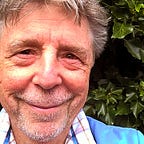My story of surviving Long Covid: the Healing Power of Nature
At the start of June 2020 I began to exhibit classic Corona symptoms: raised temperature, unproductive cough, shortness of breath, disruption of taste and general debilitation. I called the doctor; she said it sounds like Corona all right. I asked how long it takes to get over; she said they have no idea.
By the end of June my symptoms were getting worse; the doctor reckoned I’d developed a secondary lung infection on top of the Corona illness and prescribed antibiotics. These worked at first, but then I developed a second bacterial infection, treated with more antibiotics.
But by the beginning of August my health was continuing to deteriorate. A renewed fever escalated into further difficulty breathing and incessant coughing. Everything was at a very low ebb; the doc was talking about pneumonia.
In the night time I was fighting for breath and having nocturnal sweats, waking four or five times each night with clothing and bedding completely drenched; I had to set up five changes of everything before going to bed, ready to change into; in the morning everything had to be laundered and dried again ready for the next night. This was is in the middle of last summer’s big heatwave, which didn’t help.
Eventually the antibiotics started to take effect, but it wasn’t great: they added to the residual taste-disrupting Covid effects. I went completely off my food and didn’t even want to take liquids. It was a strange and horrible experience, contrary to life, really. I kept losing body weight and went down to 50 kg — quite skeletal really: no fat anywhere and muscles mass diminishing.
This time I decided to accompany the antibiotics with a programme of Chinese herbs. Eventually the antibiotic/herb combo started to work. The key herb was one that gardeners will know as a mortal enemy: Japanese Knotweed (Reynoutria Japonica) which, it turns out, possesses an armoury of powerful elements that are ideal for targeting Covid 19, in keeping with the irrepressible vitality of this invasive species.
By September I was making progress. By October I building strength and going out for walks. By mid-November I was more or less back to normal health. It had been 24 weeks.
I’d say the single thing that most helped me get through this experience day by day and make a slow but steady recovery was my urban wildlife garden. Every day I could look out the window and see nature going on there. On good days I could get out and sit in it and watch life resume around me.
I believe nature really has healing power, but there was more to it than that; connecting with the garden helped me with managing the mind which was the most challenging aspect of the illness.
It had been tempting, for instance, to think from the start: why is this happening to me? I seemed to be in excellent health before the pandemic started. This was certainly not what I had been planning for my summer. But I made efforts not to harbour such thoughts; I did not want to spend time wishing it wasn’t happening. Connecting with the garden helped my stay in the moment and validate the present.
I could also have wished I was getting better quicker, but Covid is notorious for people trying to get over it too quickly and thereby prolonging it. Connecting with the garden somehow helped me I see it as a phase: a healing phase. In a way everything is a phase; in the world of wildlife too, I could see that bad things happen: food runs short, nests fail, predators strike; but life moves on.
Accessing wild life in the garden felt like a real life-saver; I felt part of it all, soaking up the irrepressible life force and the constant vitality that’s out there. It was a daily source of comfort and emotional uplift: there was the blackbird song at dawn and dusk; the irrepressible cheerful chattiness of the sparrows whatever the time of day or weather; the wood-mouse that lives in the bottom of the compost heap, dashing out and bringing seeds back to its lair; the discovery that we had a female stag beetle onsite because horned males of the species were flying into the garden on warm evenings; the occasional sight of a sparrow-hawk explode into an unsuspecting cluster of smaller birds; and the glorious occasion when we discovered that a hedgehog was visiting the garden every night.
I could remind myself that things could be a lot worse for me. Now, I feel grateful for the whole experience. Being alive is a big advantage: that’s my new motto. I’m sure I’m not alone in having been helped so much in this way. 2020 was the year, as David Attenborough said, when we all fell in love with nature. Let’s continue that affair in 2021.
Read more about the wildlife garden project, listen to the BBC interview, watch the video:
gerrymaguirethompson.com/wildlife-and-nature
